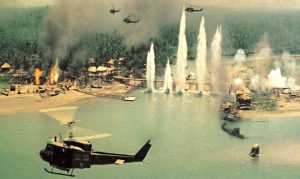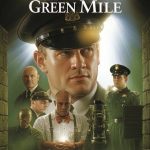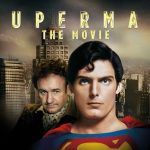Apocalypse Now (1979)

Review of Apocalypse Now (1979)
General Information
- Director: Francis Ford Coppola
- Main Cast:
- Martin Sheen (Captain Benjamin L. Willard)
- Marlon Brando (Colonel Walter E. Kurtz)
- Robert Duvall (Lieutenant Colonel Bill Kilgore)
- Frederic Forrest (Chef)
- Sam Bottoms (Lance B. Johnson)
- Laurence Fishburne (Tyrone “Mr. Clean” Miller)
- Genre: War, Drama
- Runtime: 153 minutes (Final Cut)
- Studio: United Artists
Plot
Apocalypse Now is a haunting and surreal war film set during the Vietnam War. It follows Captain Benjamin L. Willard (Martin Sheen), a troubled and seasoned officer who is tasked with a covert mission to assassinate Colonel Walter E. Kurtz (Marlon Brando), a rogue U.S. Army officer who has gone mad and set up his own autonomous cult-like army deep in the Cambodian jungle.
The journey to find and eliminate Kurtz becomes an increasingly disorienting and psychologically intense experience for Willard and his crew. As they travel down the river toward Kurtz’s base, they encounter chaotic and surreal situations that blur the lines between sanity and madness, war and humanity. The film delves into the horrors of war, the fragility of the human mind, and the dehumanizing effects of violence.
Highlights
- Francis Ford Coppola’s Direction
- Apocalypse Now is widely regarded as one of the greatest films ever made, and much of its success can be attributed to Francis Ford Coppola’s visionary direction. Coppola blends realistic war footage with hallucinatory, symbolic imagery, creating a film that feels both grounded in the horrors of war and dreamlike in its exploration of the psychological toll it takes on soldiers. The pacing, tone, and structure of the film draw the viewer into a nightmarish journey, while still capturing the brutality and confusion of the Vietnam War.
- Martin Sheen’s Performance
- Martin Sheen’s portrayal of Captain Willard is mesmerizing and deeply layered. Willard serves as the film’s emotional anchor, and Sheen’s performance captures the inner conflict, trauma, and emotional numbness of a man who has seen the worst of war. As Willard’s journey down the river becomes more surreal and disturbing, Sheen portrays a man struggling to retain his sanity while navigating a moral and psychological quagmire. His narration, which ties the film together, adds another layer of introspection to the narrative.
- Marlon Brando’s Iconic Role as Kurtz
- Marlon Brando’s performance as Colonel Kurtz is one of the most iconic in film history. Kurtz, once a respected military officer, has descended into madness after witnessing and participating in the horrors of war. Brando’s portrayal of the character is enigmatic, chilling, and haunting. Kurtz’s philosophical ramblings about the nature of war, violence, and civilization add a deep, reflective element to the film, and his presence looms over the entire story, even when he is not on screen. His final scenes are some of the most powerful and unsettling in cinema.
- Robert Duvall as Lieutenant Colonel Kilgore
- Robert Duvall’s performance as the eccentric and fearless Lieutenant Colonel Bill Kilgore is one of the film’s highlights. Kilgore, obsessed with the thrill of war and oblivious to its devastating consequences, adds an element of dark humor to the film. His memorable line, “I love the smell of napalm in the morning,” encapsulates his character’s disconnection from the horrors he’s involved in. Duvall’s performance is simultaneously chilling and absurd, providing a brief respite from the film’s heavier themes.
- Cinematography and Visuals
- The film’s cinematography, particularly by Vittorio Storaro, is stunning and unforgettable. The lush jungle landscapes, the river journey, and the chaotic battle sequences are all captured with remarkable detail. The surreal, dreamlike sequences—such as the scene with the helicopter attack accompanied by Wagner’s “Ride of the Valkyries”—are iconic in their ability to mix grandeur with madness. The striking visuals, combined with the immersive sound design, create an atmosphere that is both haunting and immersive.
- Themes of Madness, War, and Humanity
- Apocalypse Now explores some of the most profound and disturbing themes in cinema. It examines the madness of war and the breakdown of morality that occurs when humans are subjected to its horrors. As Willard moves closer to Kurtz, the film blurs the line between the two characters, suggesting that war, with its violence and brutality, has the power to strip away humanity from even the most disciplined and righteous of men. The idea of “going down the river” is a metaphor for the journey into the heart of darkness, both physically and psychologically, and it’s a theme that resonates deeply throughout the film.

- Apocalypse Now explores some of the most profound and disturbing themes in cinema. It examines the madness of war and the breakdown of morality that occurs when humans are subjected to its horrors. As Willard moves closer to Kurtz, the film blurs the line between the two characters, suggesting that war, with its violence and brutality, has the power to strip away humanity from even the most disciplined and righteous of men. The idea of “going down the river” is a metaphor for the journey into the heart of darkness, both physically and psychologically, and it’s a theme that resonates deeply throughout the film.
Criticisms
- The Length and Pacing
- Apocalypse Now is a long film, and while the deliberate pacing contributes to the mood and atmosphere, some viewers may find it slow at times. The film’s introspective moments and lengthy sequences may test the patience of those expecting more traditional war action, especially in the middle portion of the film. However, this pacing also allows the film to explore its themes deeply, making it a rewarding experience for viewers who are willing to invest the time.
- Surrealism and Ambiguity
- The surreal, dreamlike elements of the film may be off-putting to some viewers. The film is not a straightforward narrative and often leaves much open to interpretation, especially when it comes to Kurtz’s philosophy and the film’s final scenes. This ambiguity can feel unsatisfying to those who prefer clearer resolutions or explanations. However, for many, this open-endedness is a strength, allowing the film to remain a subject of discussion and analysis for years.

- The surreal, dreamlike elements of the film may be off-putting to some viewers. The film is not a straightforward narrative and often leaves much open to interpretation, especially when it comes to Kurtz’s philosophy and the film’s final scenes. This ambiguity can feel unsatisfying to those who prefer clearer resolutions or explanations. However, for many, this open-endedness is a strength, allowing the film to remain a subject of discussion and analysis for years.
Verdict
Apocalypse Now is a monumental film that has earned its place in cinema history. Its exploration of war, madness, and the human psyche is as powerful today as it was at its release in 1979. Coppola’s direction, combined with the stellar performances by Martin Sheen and Marlon Brando, creates a haunting, immersive experience that is both intellectually and emotionally challenging. The film’s visuals, music, and philosophical themes leave a lasting impact, making it a film that continues to be analyzed and appreciated by audiences and critics alike.
Rating: 9.5/10










